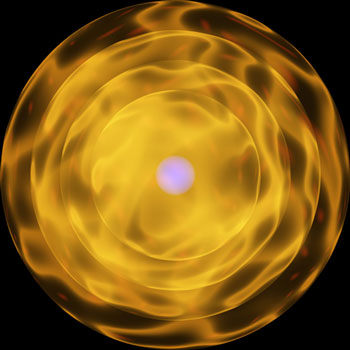 Quantum criticality, the strange electronic state that may be intimately related to high-temperature superconductivity, is notoriously difficult to study, but the first findings of a 'quantum critical point' in a category of materials known as 'oxypnictides' could lead to a broader understanding of the quantum phenomenon.
Quantum criticality, the strange electronic state that may be intimately related to high-temperature superconductivity, is notoriously difficult to study, but the first findings of a 'quantum critical point' in a category of materials known as 'oxypnictides' could lead to a broader understanding of the quantum phenomenon.
Jun 4th, 2014
Read more
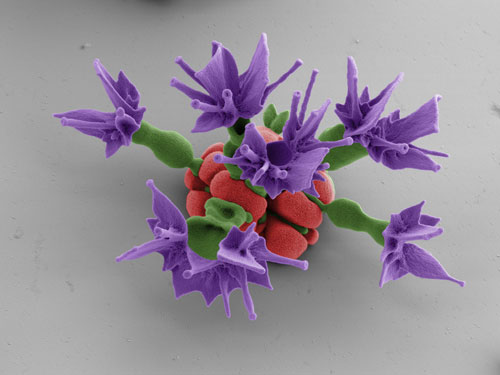 In this video, follow Harvard researchers Wim L. Noorduin and Joanna Aizenberg as they break down their process, showing how they developed these crystal 'flowers' using a beaker and two chemicals, manipulating the surrounding conditions to form them. Their research could potentially change our understanding of how structures are formed in nature, which may open the door for a new approach to nanotechnology.
In this video, follow Harvard researchers Wim L. Noorduin and Joanna Aizenberg as they break down their process, showing how they developed these crystal 'flowers' using a beaker and two chemicals, manipulating the surrounding conditions to form them. Their research could potentially change our understanding of how structures are formed in nature, which may open the door for a new approach to nanotechnology.
Jun 4th, 2014
Read more
The Institute of Electronics of the Chinese Academy of Sciences (IECAS) and Nature Publishing Group (NPG) will co-publishing a new journal in the fields of microsystems and nanoengineering called Microsystems and Nanoengineering.
Jun 4th, 2014
Read more
Recently the American publication Mother Jones published an article on the dangers of food laced with tiny metal oxide particles. The article, however, is laced with errors and misinformation.
Jun 4th, 2014
Read more
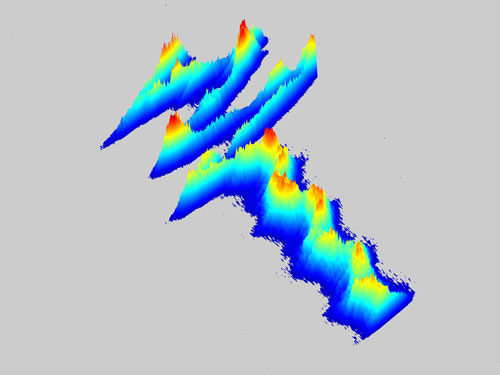 A new method was developed to utilize quantum mechanical vibrations for high precision measurements. The well-known concept of the Ramsey interferometer is applied to a complex multi particle system consisting of hundreds of atoms.
A new method was developed to utilize quantum mechanical vibrations for high precision measurements. The well-known concept of the Ramsey interferometer is applied to a complex multi particle system consisting of hundreds of atoms.
Jun 4th, 2014
Read more
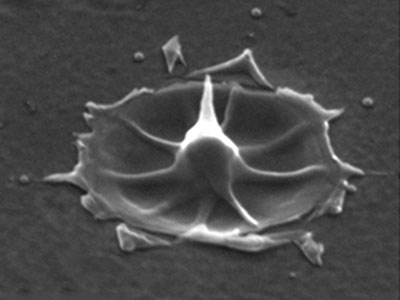 Nur zwei kurze Laserblitze ben�tigt man an der TU Wien um an einer Aluminium-Oberfl�che Nano-Strukturen zu erzeugen, die den photoelektrischen Effekt des Materials drastisch verst�rken.
Nur zwei kurze Laserblitze ben�tigt man an der TU Wien um an einer Aluminium-Oberfl�che Nano-Strukturen zu erzeugen, die den photoelektrischen Effekt des Materials drastisch verst�rken.
Jun 4th, 2014
Read more
Discovery opens new experimental path to superfast quantum computing.
Jun 4th, 2014
Read more
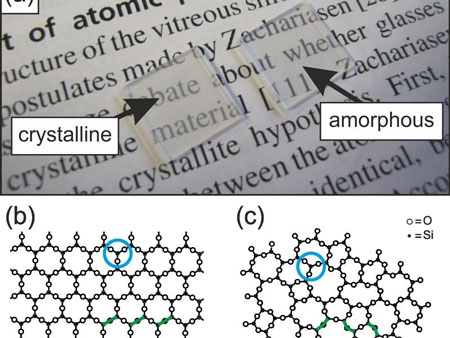 Structure of amorphous materials clarified. This project has so far been a big challenge due to the complexity of this material class. Modern preparation methods in combination with scanning tunneling microscopy succeed in decrypting the everyday material glass.
Structure of amorphous materials clarified. This project has so far been a big challenge due to the complexity of this material class. Modern preparation methods in combination with scanning tunneling microscopy succeed in decrypting the everyday material glass.
Jun 4th, 2014
Read more
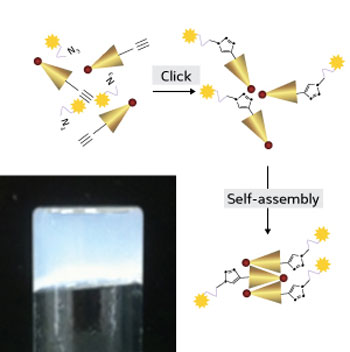 'Click' chemistry produces a hydrogel with less toxicity and greater tissue localization in a mouse cancer model.
'Click' chemistry produces a hydrogel with less toxicity and greater tissue localization in a mouse cancer model.
Jun 4th, 2014
Read more
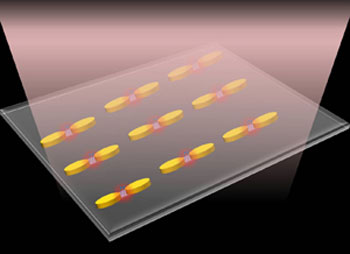 The accurate placement of molecules into gaps between gold nanoantennas enables ultrahigh-sensitivity molecular detection.
The accurate placement of molecules into gaps between gold nanoantennas enables ultrahigh-sensitivity molecular detection.
Jun 4th, 2014
Read more
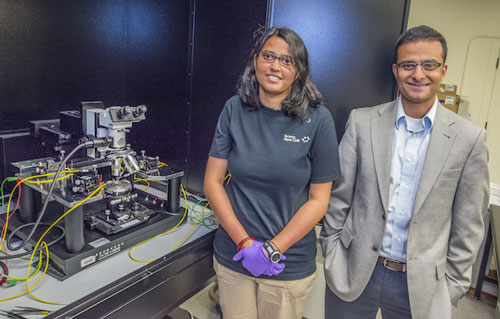 Faster electronic device architectures are in the offing with the unveiling of the world's first fully two-dimensional field-effect transistor (FET). Unlike conventional FETs made from silicon, these 2D FETs suffer no performance drop-off under high voltages and provide high electron mobility, even when scaled to a monolayer in thickness.
Faster electronic device architectures are in the offing with the unveiling of the world's first fully two-dimensional field-effect transistor (FET). Unlike conventional FETs made from silicon, these 2D FETs suffer no performance drop-off under high voltages and provide high electron mobility, even when scaled to a monolayer in thickness.
Jun 3rd, 2014
Read more
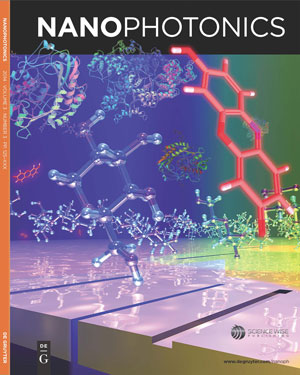 Researchers have developed a new biochip sensor that can selectively measure concentrations of glucose in a complex solution similar to human saliva. The advance is an important step toward a device that would enable people with diabetes to test their glucose levels without drawing blood.
Researchers have developed a new biochip sensor that can selectively measure concentrations of glucose in a complex solution similar to human saliva. The advance is an important step toward a device that would enable people with diabetes to test their glucose levels without drawing blood.
Jun 3rd, 2014
Read more
A research team led by food scientist Sam Nugen at UMass Amherst received a $495,950 grant to improve food safety by developing faster methods for detecting and separating microbial contamination out of food.
Jun 3rd, 2014
Read more
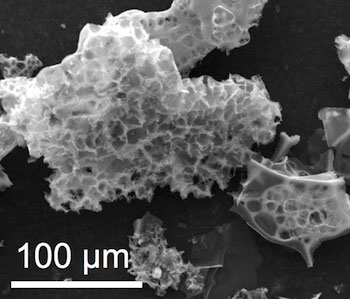 Scientists invent a porous material to capture carbon dioxide at natural gas wellheads. The recyclable material absorbs 82 percent of its weight in carbon dioxide and releases it as gas when the wellhead pressure is relieved.
Scientists invent a porous material to capture carbon dioxide at natural gas wellheads. The recyclable material absorbs 82 percent of its weight in carbon dioxide and releases it as gas when the wellhead pressure is relieved.
Jun 3rd, 2014
Read more
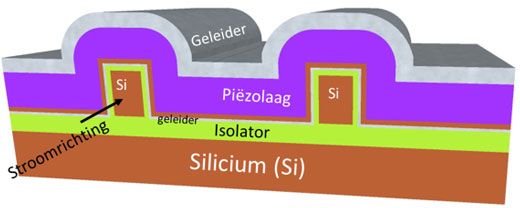 By enveloping a transistor with a shell of piezoelectric material, which distorts when voltage is applied, researchers were able to reduce this leakage by a factor of five (compared to a transistor without this material).
By enveloping a transistor with a shell of piezoelectric material, which distorts when voltage is applied, researchers were able to reduce this leakage by a factor of five (compared to a transistor without this material).
Jun 3rd, 2014
Read more
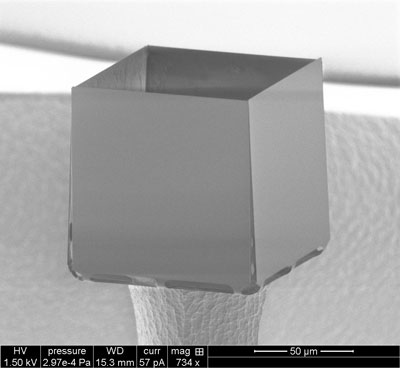 Tiny self-assembling tools could one day deliver drugs to targeted areas of the body or even perform autonomous microsurgery.
Tiny self-assembling tools could one day deliver drugs to targeted areas of the body or even perform autonomous microsurgery.
Jun 3rd, 2014
Read more
 Quantum criticality, the strange electronic state that may be intimately related to high-temperature superconductivity, is notoriously difficult to study, but the first findings of a 'quantum critical point' in a category of materials known as 'oxypnictides' could lead to a broader understanding of the quantum phenomenon.
Quantum criticality, the strange electronic state that may be intimately related to high-temperature superconductivity, is notoriously difficult to study, but the first findings of a 'quantum critical point' in a category of materials known as 'oxypnictides' could lead to a broader understanding of the quantum phenomenon.











 Subscribe to our Nanotechnology News feed
Subscribe to our Nanotechnology News feed